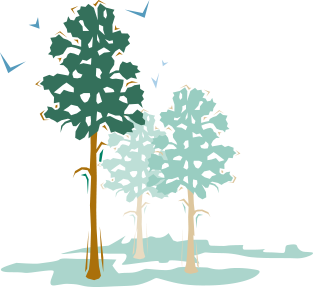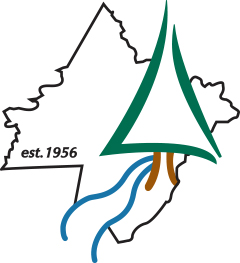
The Conservation Podcast
Pike County Conservation District has a podcast for Pike County Residents that want to learn more about our environment.
In our first few episodes, we will discuss the ways that local homes have an impact on the watershed they are in. Topics include private wells and groundwater, best management practices for stormwater, and maintaining an on-lot septic system.
Financial and other support for the Conservation Cast has been provided by the Department of Environmental Protection’s 2019 Environmental Education Grants Program. We hope you tune in to learn about the water, and the world around you right here in NEPA.

Season 2 Episode 6 - Forest Foes
Shelby Chorba, Program Manager at Northern Tier Hardwood Association, joins for this episode to chat about common invasive species in NEPA forests, their impacts, and ways to mitigate their destruction.
Season 2 Episode 5 - No More Pondering - Ponds Explained
Peter Wulfhorst, Extension Educator for Penn State Extension Pike County, joins for this episode to talk about what makes a pond different from a lake, how ponds form, and tips for those who manage a pond on their property.
Season 2 Episode 4 – Greener Gardening
Susan Detrick, Penn State Extension Master Gardener Coordinator for Pike & Monroe Counties, joins us for this episode to share all you need to know about sustainable gardening. Tune in to learn how to keep your soil healthy and plants thriving- all while supporting our natural resources and ecosystems!
Season 2 Episode 3 – The Dirt on Clean Fill
What’s the difference between dirty dirt and clean fill? Join us with Kristina Heaney, District Manager at the Monroe County Conservation District, to find out!
You can find the Form FP-001 Certification of Clean Fill referenced by Kristina here on the PA Department of Environmental Protection (DEP)’s website.
Please note that the maple sugaring program described in the episode has passed for 2024, but stay tuned for next year’s program as well as all the upcoming spring and summer events referenced in this episode!
Season 2 Episode 2 – Hidden Geocache Treasures in Pike County
There's hidden treasure in Pike County, PA-- and anyone can join the treasure hunt! In this episode, Jess Yoder, Assistant Planning Director and Preservation Planner at the Pike County Planning & Mapping Office, shares the basics of geocaching, how to get started searching our area, and some of her favorite geocaching stories.
Season 2 Episode 1 – The Forestry Frontier
Forestry-- it's the first frontier of season 2. Join us for an interview with Pike/Monroe County Service Forester Logan Goddard and Fire Forester Garrett Beers from PA DCNR as we discuss their favorite forestry factoids, sustainable forest management practices, and how deer affect our woods.
Season 2 Episode 0 – Trailer
Check out this short trailer for an overview of our second season! We'll be chatting with folks from some of our local conservation partner organizations.
Season 1 Episode 8 – Soil Conservation
Jeremy Oettinger, PCCD Resource Conservationist and resident soil expert sits down with our host to talk soil and the ways that you can conserve soil on your property!
A new resource from the District that will help you keep the soil in your yard healthy and thriving.
Season 1 Episode 7 – Road Maintenance for Conservation
Chris Ingulli the head of the Pike County Conservation District’s Dirt, Gravel, and Low Volume Road Program joins host, Devan George to talk about roads! They discuss what road maintenance has to do with conservation, and how you can use road maintenance to benefit the environment.
This episode was originally released as part of the 2020 Road Maintenance workshop, a program designed to educate local road maintenance workers on conservation issues.
Season 1 Episode 6 – Earth Day Mini-sode
Join host Devan George for a special Earth Day Mini Episode! Learn the exciting history of this holiday, how it spread worldwide, and how you can celebrate while maintaining a safe social distance.
Season 1 Episode 5 – Invasive Species
Join host Devan George to learn about invasive species. What are invasive species, how do they spread, and how can we help to stop the movement of these dangerous invaders.
Season 1 Episode 4 – Properly Maintaining Your On-Lot Septic System
Brian Oram from B.F.Environmental and the Keystone Clean Water Team joins us to teach us the Do’s and Don’ts of on-lot septic systems. Proper maintenance of these systems is an important part of caring for our watershed!
Season 1 Episode 3 – Get to Know the Water in Your Watershed!
In this episode, our senior Resource Conservationist, Ellen Enslin, teaches us about the types of water in our watersheds. There are many types of water bodies and wetlands here in Pike County, and Ellen gives us a tour of these types. Then we discuss how we can lessen our impact on our water resources.
Season 1 Episode 2 – Water quality for Homeowners
Now that we have learned about watersheds, listen to this episode to learn about ways that your can improve your home and help preserve water quality. Our resource conservationist, Marianna Quartararo, teaches us about rain gardens, rain barrels, and bioswales.
Season 1 Episode 1 – Watersheds
All land is divided into watersheds, and we all live in one, but can you name your watershed address? Knowing about watersheds will inform the rest of our episodes and is an important way to view the environment.
Listen to this episode to learn about the watersheds in Pike County from our Watershed Specialist, Rachel Posavetz.

Pike County has over 120,000 acres of land that is accessible to the public for use. This includes state and national parks, state game lands, and state forests.
Enjoy our local resources, but be sure to leave only footprints. Stay on marked trails when possible, and always pick up your trash when you leave and area.
